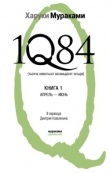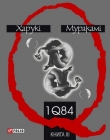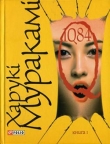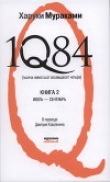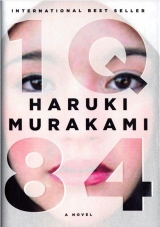
Текст книги "1q84"
Автор книги: Haruki Murakami
Жанр:
Современная проза
сообщить о нарушении
Текущая страница: 68 (всего у книги 81 страниц)
CHAPTER 18
Tengo
WHEN YOU PRICK A PERSON WITH A NEEDLE,
RED BLOOD COMES OUT
“Nothing happened for three days after that,” Komatsu said. “I ate the food they gave me, slept at night in the narrow little bed, woke up when morning came, and used the small toilet in one corner of the room. The toilet had a partition for privacy, but no lock on it. There was still a lot of residual summer heat at the time, but the ventilator shaft seemed to be connected to an AC, so it didn’t feel hot.”
Tengo listened to Komatsu’s story without comment.
“They brought food three times a day. At what time, I don’t know. They took my watch away, and the room didn’t have a window, so I didn’t even know if it was day or night. I listened carefully but couldn’t hear a sound. I doubt anyone could hear any sound from me. I had no idea where they had taken me, though I did have a vague sense that we were somewhere off the beaten track. Anyhow, I was there for three days, and nothing happened. I’m not actually certain it was three days. They brought me nine meals altogether, and I ate them when they brought them. The lights in the room were turned out three times, and I slept three times. Usually I’m a light, irregular sleeper, but for some reason I slept like a log. It’s kind of strange, if you think about it. Do you follow me so far?”
Tengo silently nodded.
“I didn’t say a word for the entire three days. A young man brought my meals. He was thin and had on a baseball cap and a white medical face mask. He wore a kind of sweatshirt and sweatpants, and dirty sneakers. He brought my meals on a tray and then took them away when I was finished. They used paper plates and flimsy plastic knives, forks, and spoons. The food they brought was ordinary prepared food in silver foil packages—not very good, but not so bad you wouldn’t eat it. They didn’t bring much each meal, and I was hungry, so I ate every bite. This was kind of weird, too. Usually I don’t have much of an appetite, and if I’m not careful, sometimes I even forget to eat. They gave me milk and mineral water to drink. They didn’t provide coffee or tea. No single-malt whiskey or draft beer. No smokes, either. But what’re you going to do? It wasn’t like I was lounging around some nice hotel.”
As if he had just remembered that now he could smoke at his leisure, Komatsu pulled out a red Marlboro pack, stuck a cigarette between his lips, and lit it with a paper match. He sucked the smoke deep into his lungs, exhaled, and then frowned.
“The man who brought the meals never said a word. He must have been ordered by his superiors not to say anything. I’m sure he was at the bottom of the totem pole, a kind of all-purpose gofer. I think he must have been trained in one of the martial arts, though. He had a sort of focus to the way he carried himself.”
“You didn’t ask him anything?”
“I knew that if I spoke to him, he wouldn’t respond, so I just kept quiet and let things be. I ate the food they brought me, drank my milk, went to bed when they turned out the lights, woke up when they turned them back on. In the morning the young guy would come and bring me an electric razor and toothbrush, and I would shave and brush my teeth. When I was done he would take them back. Other than toilet paper, there was nothing else to speak of in the room. They didn’t let me take a shower or change my clothes, but I never felt like taking a shower or changing. There was no mirror in the room, but that didn’t bother me. The worst thing was definitely the boredom. I mean, from the time I woke up till the time I went to sleep, I had to sit there alone, not speaking to anyone, in this white, completely square, dice-like room. I was bored to tears. I’m kind of a print junkie, I always need to have something to read with me—a room-service menu, you name it. But I didn’t have any books, newspapers, or magazines. No TV or radio, no games. No one to talk to. Nothing to do but sit in the chair and stare at the floor, the walls, the ceiling. It was a totally absurd feeling. I mean, you’re walking down the road when some people jump out of nowhere, grab you, put chloroform or something over your nose, drag you off somewhere, and hold you in a strange, windowless little room. A weird situation no matter how you cut it. And you get so bored you think you’re going to lose your mind.”
Komatsu stared with deep feeling at the cigarette between his fingers, the smoke curling up, then flicked the ash into the ashtray.
“I think they must have thrown me into that tiny room for three days, with nothing to do, trying to get me to break down. They seemed to know what they were doing when it came to breaking a person’s spirit, pushing someone to the edge. On the fourth day—after I had my fourth breakfast, in other words—two other men came in. I figured this was the pair that had kidnapped me. I was attacked so suddenly that I didn’t get a good look at their faces. But when I saw them on the fourth day, it started to come back to me—how they had pulled me into the car so roughly that I thought they were going to twist my arm off, how they had stuffed a cloth soaked with some kind of drug on my nose and mouth. The two of them didn’t say a word the whole time, and it was over in an instant.”
Remembering the events, Komatsu frowned.
“One of them wasn’t very tall, but he was solidly built, with a buzzcut. He had a deep tan and prominent cheekbones. The other one was tall, with long limbs, sunken cheeks, his hair tied up behind him in a ponytail. Put them side by side and they looked like a comedy team. You’ve got your tall, thin one, and your short, stocky one with a goatee. But I could tell at a glance these were no comedians. They were a dangerous pair. They would never hesitate to do whatever had to be done, without making a big scene. They acted very relaxed, which made them all the more scary, and their eyes were frighteningly cold. They both wore black cotton trousers and white short-sleeved shirts. They were probably in their mid– to late twenties, the bald one maybe a little older than the other one. Neither one wore a watch.”
Tengo was silent, waiting for him to go on.
“Buzzcut did all the talking. Ponytail just stood there in front of the door, ramrod straight, without moving a muscle. It seemed like he was listening to our conversation, but then again, maybe not. Buzzcut sat down right across from me in a folding metal chair he had brought, and talked. There were no other chairs, so I sat on the bed. The guy had no facial expression at all. His mouth moved when he spoke, but other than that, his face was frozen, like a ventriloquist’s dummy.”
The first thing Buzzcut said when he sat down across from Komatsu was this: “Are you able to guess who we are, and why we brought you here?”
“No, I can’t,” Komatsu replied.
Buzzcut stared at Komatsu for a while with his depthless eyes. “But say you had to make a guess,” he went on, “what would you say?” His words were polite enough, but his tone was forceful, his voice as hard and cold as a metal ruler left for a long time in a fridge.
Komatsu hesitated, but then said, honestly, that if he were forced to make a guess, he would say it had something to do with the Air Chrysalis affair. Nothing else came to mind. “That would mean you two are probably from Sakigake,” he continued, “and we are in your compound.”
Buzzcut neither confirmed nor denied what Komatsu had said. He just stared at him. Komatsu kept silent as well.
“Let’s talk, then, based on that hypothesis,” Buzzcut quietly began. “What we’re going to say from now on is an extension of that hypothesis of yours, all based on the assumption that this is indeed the case. Is that acceptable?”
“That would be fine,” Komatsu replied. They were going to talk about this as indirectly as they could. This was not a bad sign. If they were planning not to let him out of here alive, they wouldn’t go to the trouble.
“As an editor at a publishing house, you were in charge of publishing Eriko Fukada’s Air Chrysalis. Am I correct?”
“You are,” Komatsu admitted. This was common knowledge.
“Based on our understanding, there was some fraud involved in the publication. Air Chrysalis received a literary prize for debut novelists from a literary journal. But before the selection committee received the manuscript, a third party rewrote it considerably at your direction. After the work was secretly revised, it won the prize, was published as a book, and became a bestseller. Do I have my facts correct?”
“It depends on how you look at it,” Komatsu said. “There are times when a submitted manuscript is rewritten, on advice of the editor—”
Buzzcut put his hand up to cut him off. “There’s nothing dishonest about the author revising parts of the novel based on the editor’s advice. You’re right. But having a third party rewrite the work is unscrupulous. Not only that, but forming a phony company to distribute royalties—I don’t know how this would be interpreted from a legal standpoint, but morally speaking these actions would be roundly condemned. It’s inexcusable. Newspapers and magazines would have a field day over it, and your company’s reputation would suffer. I’m sure you understand this very well, Mr. Komatsu. We know all the facts, and have incontrovertible proof we can reveal to the world. So it’s best not to try to talk your way out of it. It’s a waste of time, for both of us.”
Komatsu nodded.
“If it did come to that, obviously you would have to resign from the company. Plus, you know that you would be blackballed from the field. There would be no place left for you in publishing. For legitimate work, at least.”
“I imagine not,” Komatsu said.
“But at this point only a limited number of people know the truth,” Buzzcut said. “You, Eriko Fukada, Professor Ebisuno, and Tengo Kawana, who rewrote the book. And just a handful of others.”
Komatsu chose his words carefully. “According to our working hypothesis, this handful of others would be members of Sakigake.”
Buzzcut nodded, barely. “Yes. According to our hypothesis, that would be the case.”
Buzzcut paused, allowing the hypothesis to sink in. And then he went on.
“And if that hypothesis is indeed true, then they can do whatever they want to you. They can keep you here as their guest of honor for as long as they like. No problem at all. Or, if they wanted to shorten the length of your stay, there are any number of other choices they can make—including ones that would be unpleasant for both sides. Either way, they have the power and the means. I believe you already have a pretty good grasp of that.”
“I think I do,” Komatsu replied.
“Good,” Buzzcut said.
Buzzcut raised a finger, and Ponytail left the room. He soon returned with a phone. He plugged it into a jack on the wall and handed the phone to Komatsu. Buzzcut directed him to call his company.
“You have had a terrible cold and a fever and have been in bed for a few days. It doesn’t look like you’ll be able to come in to work for a while. Tell them that and then hang up.”
Komatsu asked for one of his colleagues, briefly explained what he had to say, and hung up without responding to his questions. Buzzcut nodded and Ponytail unplugged the phone from the jack and took the phone and left the room. Buzzcut intently studied the back of his hands, then turned to Komatsu. There was a faint tinge of kindness in his voice.
“That’s it for today,” he said. “We’ll talk again another day. Until then, please consider carefully what we have discussed.”
The two of them left, and Komatsu spent the next ten days in silence, in that room. Three times a day the masked young man would bring in the mediocre meals. After the fourth day, Komatsu was given a change of clothes—a cotton pajama-like top and bottom—but until the very end, they didn’t let him take a shower. The most he could do was wash his face in the tiny sink attached to the toilet. His sense of time’s passage grew more uncertain.
Komatsu thought that he had been taken to the cult’s headquarters in Yamanashi. He had seen it on TV. It was deep in the mountains, surrounded by a tall fence, like some independent realm. Escape, or finding help, was out of the question. If they did end up killing him (which must be what they had meant by an unpleasant choice), his body would never be found. He had never felt death so real, or so close.
Ten days after he had made that forced call to his company (most likely ten days, though he wouldn’t bet on it), the same duo made another appearance. Buzzcut seemed thinner than before, which made his cheekbones all the more prominent. His cold eyes were now bloodshot. As before, he sat down on the folding chair he had brought, across the table from Komatsu. He didn’t say a word for a long time. He simply stared at Komatsu with his red eyes.
Ponytail looked the same. Again he stood, ramrod straight, in front of the door, his emotionless eyes fixed on an imaginary point in space. They were again dressed in black trousers and white shirts, most likely a sort of uniform.
“Let’s pick up where we left off last time,” Buzzcut finally said. “We were saying that we can do whatever we like with you.”
Komatsu nodded. “Including choices that wouldn’t be pleasant for either side.”
“You really do have a great memory,” Buzzcut said. “You are correct. An unpleasant outcome is looming.”
Komatsu was silent. Buzzcut went on.
“In theory, that is. Practically speaking, they would much prefer not to make an extreme choice. If you were suddenly to disappear now, Mr. Komatsu, that would lead to unwanted complications. Just like it did when Eriko Fukada disappeared. There aren’t many people who would be sad if you were gone, but you’re a respected editor, prominent in your field. And I’m sure that if you fall behind in your alimony payments, your wife will have something to say about it. For them, this would not be a very favorable development.”
Komatsu gave a dry cough and swallowed.
“They’re not criticizing you personally, or trying to punish you. They understand that in publishing Air Chrysalis you weren’t intending to attack a specific religious organization. At first you didn’t even know the connection between the novel and that organization. You perpetrated this fraud for fun and out of ambition. And money became a factor, too, as things developed. It’s very hard for a mere company employee to pay alimony and child support, isn’t it? And you brought Tengo Kawana—an aspiring novelist and cram school instructor who didn’t know anything about the circumstances—into the mix. The plan itself was smart, but your choice of the novel and the writer? Not so much. And things got more complicated than you imagined. You were like ordinary citizens who had wandered across the front lines and stepped into a minefield. You can’t go forward, and can’t go back. Am I correct in this, Mr. Komatsu?”
“That might sum it up, I suppose,” Komatsu replied.
“There still seem to be some things you don’t entirely understand,” Buzzcut said, his eyes narrowing a fraction. “If you did, you wouldn’t pretend that this has nothing to do with you. Let’s make things crystal clear. You are, frankly, in the middle of a minefield.”
Komatsu silently nodded.
Buzzcut closed his eyes, and ten seconds later opened them. “This situation has put you in a bind, but understand that it has created some real problems for them as well.”
Komatsu took the plunge and spoke. “Do you mind if I ask you a question?”
“If it’s something I can answer.”
“By publishing Air Chrysalis we created a little trouble for the religious organization. Is that what you’re saying?”
“More than a little trouble,” Buzzcut said. He grimaced slightly. “The voice no longer speaks to them. Do you have any idea what that means?”
“No,” Komatsu croaked, his voice dry.
“Fine. I can’t explain any more to you than that. And it’s better for you not to know. The voice no longer speaks to them. That’s all I can tell you now.” Buzzcut paused. “And this unhappy turn of events was brought about by the publication of Air Chrysalis.”
Komatsu posed a question. “And did Eriko Fukada and Professor Ebisuno expect that by making Air Chrysalis public, they would bring about this unhappy turn of events?”
Buzzcut shook his head. “No, I don’t think Professor Ebisuno knew things would turn out this way. It’s unclear what Eriko Fukada’s intentions were. Saying it was unintentional is just conjecture. But even if you assume it was intentional, I don’t believe it was her intention.”
“People read Air Chrysalis as a fantasy novel,” Komatsu said. “A harmless, dreamy little tale written by a high school girl. Actually the novel was criticized quite a lot for being a bit too surreal. No one ever suspected that some great secret, or concrete information, was exposed in the pages of the book.”
“I imagine you’re right,” Buzzcut said. “The vast majority of people would never notice. But that’s not the issue. Those secrets should never have been made public. In any form whatsoever.”
Ponytail stood rooted to a spot in front of the door, staring at the wall, at some prospect that no one else could see.
“What they want is to get the voice back,” Buzzcut said, choosing his words. “The well hasn’t run dry. It has just sunk down deeper, where it can’t be seen. It will be quite difficult to restore, but it can be done.”
Buzzcut looked deep into Komatsu’s eyes. He looked like he was measuring the depths of something inside, like eyeballing a room to see if a piece of furniture would fit.
“As I said earlier, all of you have wandered into a minefield. You can’t go forward, and you can’t go back. What they can do is show you the path, so you can get out safely. If they do, you’ll have a narrow escape, and they’ll peacefully manage to get rid of some bothersome intruders.”
Buzzcut folded his arms.
“We would like you to quietly withdraw from all this. They aren’t really concerned if you leave here in one piece. But it will present problems if we make a lot of noise here right now. So, Mr. Komatsu, I will show you the way to retreat. I will guide you back to a safe place. What I ask for in return is the following: You must stop publishing Air Chrysalis. You won’t print any more copies, or reprint it in paperback. And all advertising for the book will cease. And you will sever all connections with Eriko Fukada. What do you say? You have enough influence to handle that.”
“It won’t be easy, but maybe I can manage it,” Komatsu said.
“Mr. Komatsu, we didn’t bring you all the way here to talk about maybes.” Buzzcut’s eyes grew even redder and sharper. “We’re not asking you to collect all the copies of the book that are out there. Do that, and the media would jump on the story. And we know your influence doesn’t extend that far. We would just like you to quietly take care of things. We can’t undo what has already happened. Once something’s ruined, it can’t go back to the way it was. What they would like is to remove this from the spotlight. Do you follow me?”
Komatsu nodded.
“Mr. Komatsu, as I have explained, there are several facts here that must not come to light. If they did, all those involved would suffer repercussions. So for the sake of both parties, we would like to conclude a truce. They will not hold you responsible beyond this point. Peace will be guaranteed. You will have nothing further to do with Air Chrysalis. This isn’t such a bad deal, you know.”
Komatsu thought it over. “All right. I will begin by making sure Air Chrysalis is no longer published. It may take some time, but I’ll find a way. And speaking personally, I can put this entire matter out of my mind. I think Tengo Kawana can do the same. He wasn’t enthusiastic about it from the very beginning. I got him involved against his will. His role in this is long past. And I don’t think Eriko Fukada will be a problem. She said that she doesn’t plan to write any more novels. Professor Ebisuno is the only one whose reaction I can’t gauge. Ultimately he wanted to determine if his friend, Tamotsu Fukada, was all right. He wants to know where he is now and what he’s doing. Whatever I might tell him, he may continue to pursue information on Mr. Fukada.”
“Tamotsu Fukada is dead,” Buzzcut said. His voice was quiet, uninflected, but there was something terribly heavy within.
“Dead?” Komatsu asked.
“It happened recently,” Buzzcut said. He took a deep breath and slowly exhaled. “He died of a heart attack. It was over in a moment, and he didn’t suffer. Due to the circumstances, we didn’t submit a notification of death, and we held the funeral secretly at our compound. For religious reasons the body was incinerated, the bones crushed and sprinkled in the nearby mountains. Legally, this constitutes desecration of a body, but it would be difficult to make a formal case against us. But this is the truth. We never lie when it comes to matters of life and death. I would like you to let Professor Ebisuno know about this.”
“A natural death.”
Buzzcut nodded deeply. “Mr. Fukada was a very important person for us. No—important is too trite a term to express what he was. He was a giant. His death has only been reported to a limited number of people. They grieved deeply for the loss. His wife—Eriko Fukada’s mother—died several years ago of stomach cancer. She refused chemotherapy, and passed away within our treatment facility. Her husband, Tamotsu, cared for her to the end.”
“Even so, you didn’t file a notification of her death,” Komatsu asked.
No words of denial came.
“And Tamotsu Fukada passed away recently.”
“Correct,” Buzzcut said.
“Was this after Air Chrysalis was published?”
Buzzcut’s gaze went down to the table for a moment, then he raised his head and looked at Komatsu.
“That’s right. Mr. Fukada passed away after Air Chrysalis was published.”
“Are the two events related?” Komatsu dared to ask.
Buzzcut didn’t say anything for a while, pondering how he should respond. Finally, as if he had made up his mind, he spoke. “Fine. I think it might be best to let Professor Ebisuno know all the facts, so he will understand. Mr. Tamotsu Fukada was the real Leader, the one who hears the voice. When his daughter, Eriko Fukada, published Air Chrysalis, the voice stopped speaking to him, and at that point Mr. Fukuda himself put an end to his existence. It was a natural death. More precisely, he put an end to his own existence naturally.”
“Eriko Fukada was the daughter of Leader,” Komatsu murmured.
Buzzcut gave a concise, abbreviated nod.
“And Eriko Fukada ended up driving her father to his death,” Komatsu continued.
Buzzcut nodded once more. “That is correct.”
“But the religion still continues to exist.”
“The religion does still exist,” Buzzcut replied, and he stared at Komatsu with eyes like ancient pebbles frozen deep within a glacier. “Mr. Komatsu, the publication of Air Chrysalis has done more than a little damage to Sakigake. However, they are not thinking to punish you for this. There is nothing to be gained from punishing you at this point. They have a mission they must accomplish, and in order to do so, quiet isolation is required.”
“So you want everyone to take a step back and forget it all happened.”
“In a word, yes.”
“Was it absolutely necessary to kidnap me in order to get this message across?”
Something akin to an expression crossed Buzzcut’s face for the first time, a superficial emotion, located somewhere in the interstice between humor and sympathy. “They went to the trouble of bringing you here because they wanted you to understand the seriousness of the situation. They didn’t want to do anything drastic, but if something is necessary, they don’t hesitate. They wanted you to really feel this, viscerally. If all of you do not keep your promise, then something quite unpleasant will occur. Do you follow me?”
“I do,” Komatsu replied.
“To tell you the truth, Mr. Komatsu, you were very fortunate. Because of all the heavy fog you may not have noticed this, but you were just a few inches from the edge of a cliff. It would be best if you remember this. At the moment they do not have the freedom to deal with you. There are many more pressing matters at hand. And in that sense, too, you are quite fortunate. So while this good fortune still continues …”
As he said this he turned his palms faceup, like someone checking to see if it was raining. Komatsu waited for his next words, but there weren’t any. Now that he had finished speaking, Buzzcut looked exhausted. He slowly rose from his chair, folded it, and exited the cube-shaped room without so much as a glance back. The heavy door closed, the lock clicking shut. Komatsu was left all alone.
“They kept me locked away in that square little room for four more days. We had already discussed what was important. They had told me what they wanted to say and we had come to an agreement. So I couldn’t see the point of keeping me there any longer. That duo never appeared again, and the young man in charge of me never uttered a word. I ate the same monotonous food, shaved with the electric razor, and spent my time staring at the ceiling and the walls. I slept when they turned off the lights, woke up when they switched them on. And I pondered what Buzzcut had told me. What really struck me most was the fact that he said we were fortunate. Buzzcut was right. If these guys wanted to, they could do anything they wanted. They could be as cold-blooded as they liked. While I was locked up in there, I really came to believe this. I think they must have kept me locked up for four more days knowing that would be the result. They don’t miss a beat—they’re very meticulous.”
Komatsu picked up his glass and took a sip of the highball.
“They drugged me again with chloroform or whatever, and when I woke up it was daybreak and I was lying on a bench in Jingu Gaien. It was the end of September, and the mornings were cold. Thanks to this I actually did wind up with a cold and a fever and I really was in bed for the next three days. But I guess I should consider myself fortunate if that’s the worst that happened to me.”
Komatsu seemed to be finished with his story. “Did you tell this to Professor Ebisuno?” Tengo asked.
“Yes, after I was released, and a few days after my fever broke, I went to his house on the mountain. I told him pretty much what I told you.”
“What was his reaction?”
Komatsu drained the last drop of his highball and ordered a refill. He urged Tengo to do the same, but Tengo shook his head.
“Professor Ebisuno had me repeat the story over and over and asked a lot of detailed questions. I answered whatever I could. I could repeat the same story as many times as he wished. I mean, after I last spoke with Buzzcut, I was locked up alone for four days in that room. I had nobody to talk to, and plenty of time on my hands. So I went over what he had told me and was able to accurately remember all the details. Like I was a human tape recorder.”
“But the part about Fuka-Eri’s parents dying was just something they claimed happened. Right?” Tengo asked.
“That’s right. They insisted it happened, but there’s no way to verify it. They didn’t file a death notice. Still, considering the way Buzzcut sounded, it didn’t seem like he was making it up. As he said, Sakigake considers people’s lives and deaths a sacred thing. After I finished my story, Professor Ebisuno was silent for a time, thinking it over. He really thinks about things deeply, for a long time. Without a word, he stood up, left the room, and didn’t come back for quite a while. I think he was trying to accept his friends’ deaths, trying to understand them as inevitable. He may have already half expected that they were no longer of the world and had resigned himself to that fact. Still, actually being told that two close friends have died has got to hurt.”
Tengo remembered the bare, spartan living room, the chilly, deep silence, the occasional sharp call of a bird outside the window. “So,” he asked, “have we actually backed our way out of the minefield?”
A fresh highball was brought over. Komatsu took a sip.
“No conclusion was reached right then. Professor Ebisuno said he needed time to think. But what other choice do we have than to do what they told us? I got things rolling right away. At work I did everything I could and stopped them from printing additional copies of Air Chrysalis, so in effect it’s out of print. There will be no paperback edition, either. The book already sold a lot of copies and made the company plenty of money, so they won’t suffer a loss. In a large company like this you have to have meetings about it, the president has to sign off on it—but when I dangled before them the prospect of a scandal connected with a ghostwriter, the higher-ups were terrified and in the end did what I wanted. It looks like I’ll be given the silent treatment from now on, but it’s okay. I’m used to it.”
“Did Professor Ebisuno accept what they said about Fuka-Eri’s parents being dead?”
“I think so,” Komatsu said. “But I imagine it will take some time for it to really sink in, for him to fully accept it. As far as I could tell, those guys were serious. They would make a few concessions, but I think they’re hoping to avoid any more trouble. Which is why they resorted to kidnapping—they wanted to make absolutely sure we got the message. And they didn’t need to tell me about how they secretly incinerated the bodies of Mr. and Mrs. Fukada. Even though it would be hard to prove, desecration of bodies is a major crime. But still they brought it up. They laid their cards on the table. That’s why I think most of what Buzzcut told me was the truth. Maybe not every detail, but the overall picture, at least.”
Tengo went over what Komatsu had told him. “Fuka-Eri’s father was the one who heard the voice. A prophet, in other words. But when his daughter published Air Chrysalis and it became a bestseller, the voice stopped speaking to him, and as a result the father died a natural death.”
“Or rather he put an end to his own existence naturally,” Komatsu said.
“And so it’s critical for Sakigake to gain a new prophet. If the voice stops speaking, then the religion’s whole reason for existence is lost. So they don’t have the time to worry about the likes of us. In a nutshell, that’s the story, right?”


